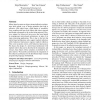Free Online Productivity Tools
i2Speak
i2Symbol
i2OCR
iTex2Img
iWeb2Print
iWeb2Shot
i2Type
iPdf2Split
iPdf2Merge
i2Bopomofo
i2Arabic
i2Style
i2Image
i2PDF
iLatex2Rtf
Sci2ools
126
Voted
DLS
2007
2007
Mirages: behavioral intercession in a mirror-based architecture
Mirror-based systems are object-oriented reflective architectures built around a set of design principles that lead to reflective APIs which foster a high degree of reusability, loose coupling with base-level objects and whose structure and design corresponds to the system being mirrored. However, support for behavioral intercession has been limited in contemporary mirror-based architectures, in spite of its many interesting applications. This is due to the fact that mirror-based architectures only support explicit reflection, while behavioral intercession requires implicit reflection. This work reconciles mirrors with behavioral intercession. We discuss the design of a mirror-based architecture with implicit mirrors that can be absorbed in the interpreter, and mirages, base objects whose semantics are defined by implicit mirrors. We describe and illustrate the integration of this reflective architecture for the distributed object-oriented programming language AmbientTalk. Categories ...
Behavioral Intercession | DLS 2007 | Languages | Mirror-based Architecture | Reflective Architecture |
| Added | 14 Aug 2010 |
| Updated | 14 Aug 2010 |
| Type | Conference |
| Year | 2007 |
| Where | DLS |
| Authors | Stijn Mostinckx, Tom Van Cutsem, Stijn Timbermont, Éric Tanter |
Comments (0)

